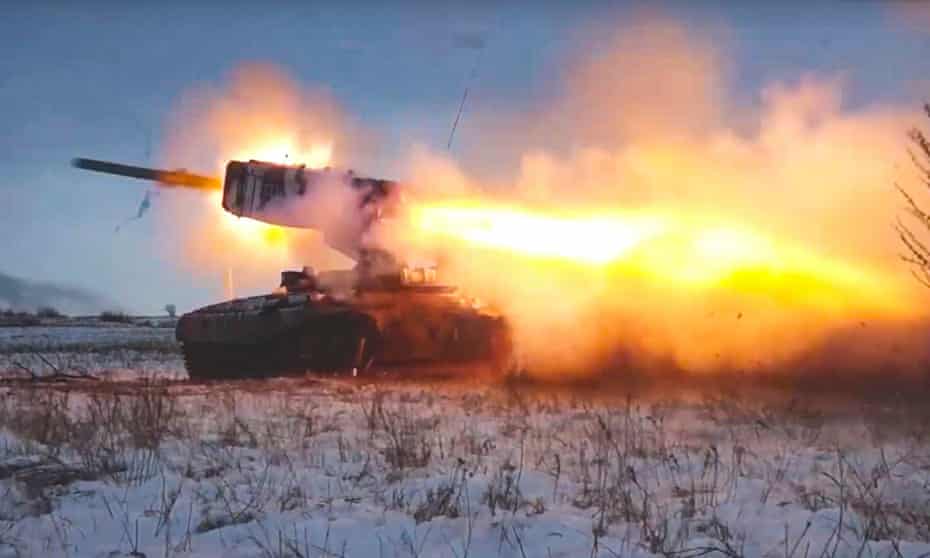Ukraine's Agony
"Everyone is talking about invasion, but I can think of lots of things Putin could do short of invasion.""And the West would be left wondering, again, what to do."Orysia Lutsevych, Ukraine analyst, Chatham House"It [amphibious and airborne operation to capture Odessa, Ukraine's most important port] would spread Ukrainian forces, impose a dilemma on them in trying to discern the main thrust, and threaten operational encirclement and have a strong probability of cutting them off from logistical supplies."Michael Kofman, director, Russia studies, Washington think tank CNA
 |
| A Russian multiple rocket launcher is fired during military drills near Orenburg, Russia, in December 2021. Photograph: Russian Defence Ministry Press Service/EPA |
Ukraine,
facing a test of endurance under dire pressure of intimidation and
threat of invasion has made its appeal to NATO for aid in standing off
its vulnerability to Russia's superior long-range artillery, rockets,
cruise missiles and air strikes. Its courage and determination would be
much enhanced by advanced defensive military gear such as the U.S.
Patriot system. NATO has turned down that possibility. The ordeal of
waiting for what may be the inevitable is Ukraine's alone.
Yes, NATO,
the United States and their allies all stand behind Ukraine in its
ordeal, but they will not stand in front of Ukraine. They will warn
Moscow not to proceed lest the West be displeased and exert economic
pressure through sanctions, a route often taken before, with Russia. The
West stood agape and did nothing when Russia invaded Georgia. It did
the same with more emphasis on criticizing the Kremlin's decision to
send its military in disguise into Ukraine's Donbass.
And
then froze Russia out of the G7(8) when it brazenly took possession of
the Crimea. Vladimir Putin is single-minded about the former Soviet
Union's absorption of its neighbours into a union where it could boast
each of its-then satellites was 'equal among equals'. All were equally
under the thrall and direction of the USSR mandate to smother sovereign
powers into one giant Moscow-directed unity. Nostalgia for that time in
history prods Mr. Putin forward, offering a new embrace to horrified
neighbours.
The
slow and steady intimidation Ukraine has been subjected to is that of a
monster sea creature with gaping jaws and grasping tentacles torturing a
fellow sea creature helpless, but prepared to continue struggling while
the predator slowly consumes its flesh. The sea's other occupants look
on with fearful fascination, knowing that once the monster has satiated
its appetite it will turn around to look for other sadistic meals and
they are all candidates.
 |
| Inside one of the Cold War era bomb shelters in Kyiv being prepared for possible use again. (Jean-François Bisson/CBC) |
Theories
abound; that large troop buildup on Ukraine's border, the tanks, the
artillery, the sharp-shooters ostensibly on a training mission, is very
prolonged, and meant to be threatening, a hint of what is yet to come
and might already have, were it not for the nuisance intervention of
NATO, prepared to issue retaliatory threats, but not actual, physical
presence of back-up on the scene within Ukraine's borders.
Who, after all, is anxious to provoke another world war in Europe?
On
the other hand, the belligerents are not prepared to stand down having
committed themselves so far with the world watching and waiting. On the
balance of probabilities might it be a full-scale invasion? An
encircling of Kyiv? The outright annexation of half the country? Kyiv
might be a problem; its three million Ukraines nurse bitter memories,
distrust and animosity toward Moscow; no friendly open arms would greet
invading troops and the death toll would be enormous.
An
alternative might be the Kremlin ordering 'peacekeepers' into the
Russian-controlled separatist republics that Donetsk and Luhansk have
become, making the transition from Ukraine to Russia official and
permanent. Would Kyiv accept that as a reality? What would NATO's move
then be? Well of course the West would express its disgust, deploring
the internationally unlawful move. And at the United Nations China and
Russia on the Security Council would block official sanctions.
Ukraine,
while having updated and modernized its military since 2015 when its
antiquated military equipment feebly opposed Russia's greater
capabilities and war machinery, now would be opposing a Russian military
that has in the past five years achieved great technological strides in
modernization and lethal effectiveness.
Russia
has long had its eye on the Azov sea coast running between Crimea and
Russia, a far more direct and effective route to consolidate its seizure
of the peninsula. The coastal cities of Mariupol and Berdyansk would
fall to Russia to be incorporated into Greater Russia, a coup long in
the planning and ripe for integration, restoring part of Ukraine to
Mother Russia. Reversing Kyiv's move to cut off a conduit for fresh
water to Crimea after 2014's annexation.

"Overrunning a substantial area of Ukraine is widely dismissed as unfeasible, but even a limited land grab would serve little purpose when Russia can already exert political leverage through its control of parts of the eastern provinces of Donetsk and Luhansk. Russia could instead be considering a temporary incursion – raiding, destroying, and then withdrawing – but much the same effect could be achieved from across the border.""Stand-off strikes using missiles, or potentially a destructive cyber onslaught, could target military command and control systems or civilian critical infrastructure and pressure Kyiv into concessions and its friends abroad into meeting Russia’s demands.""And removing the troop concentrations from the Ukrainian border need not be a climbdown by Russia, especially if they move west to form a permanent contingent in Belarus – directly threatening not only Ukraine’s northern flank, but also NATO members Poland, Lithuania, and Latvia."Keir Gilles, Senior Consulting Fellow, Russia and Eurasia Programme, Chatham House, Dec.21/21
Labels: Annexing Eastern Ukraine, Intimidation, Threats, Ukraine, Vladimir Putin, War

<< Home